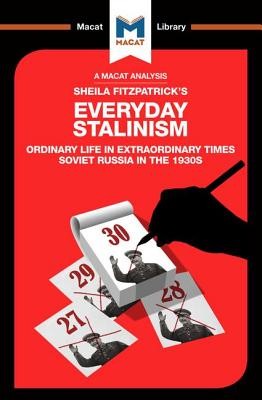
- We will send in 10–14 business days.
- Author: Victor Petrov
- Publisher: Macat Library
- ISBN-10: 1912128101
- ISBN-13: 9781912128105
- Format: 12.9 x 19.8 x 0.5 cm, minkšti viršeliai
- Language: English
- SAVE -10% with code: EXTRA
An Analysis of Sheila Fitzpatrick's Everyday Stalinism (e-book) (used book) | bookbook.eu
Reviews
Description
How was the Soviet Union like a soup kitchen? In this important and highly revisionist work, historian Sheila Fitzpatrick explains that a reimagining of the Communist state as a provider of goods for the 'deserving poor' can be seen as a powerful metaphor for understanding Soviet life as a whole. By positioning the state both as a provider and as a relief agency, Fitzpatrick establishes it as not so much a prison (the metaphor favoured by many of her predecessors), but more the agency that made possible a way of life.
Fitzpatrick's real claim to originality, however, is to look at the relationship between the all-powerful totalitarian government and its own people from both sides - and to demonstrate that the Soviet people were not totally devoid of either agency or resources. Rather, they successfully developed practices that helped them to navigate everyday life at a time of considerable danger and multiple shortages. For many, Fitzpatrick shows, becoming an informer and reporting fellow citizens - even family and friends - to the state was a successful survival strategy.
Fitzpatrick's work is noted mainly as an example of the critical thinking skill of reasoning; she marshals evidence and arguments to deliver a highly persuasive revisionist description of everyday life in Soviet time. However, her book has been criticized for the way in which it deals with possible counter-arguments, not least the charge that many of the interviewees on whose experiences she bases much of her analysis were not typical products of the Soviet system.
- Author: Victor Petrov
- Publisher: Macat Library
- ISBN-10: 1912128101
- ISBN-13: 9781912128105
- Format: 12.9 x 19.8 x 0.5 cm, minkšti viršeliai
- Language: English English
How was the Soviet Union like a soup kitchen? In this important and highly revisionist work, historian Sheila Fitzpatrick explains that a reimagining of the Communist state as a provider of goods for the 'deserving poor' can be seen as a powerful metaphor for understanding Soviet life as a whole. By positioning the state both as a provider and as a relief agency, Fitzpatrick establishes it as not so much a prison (the metaphor favoured by many of her predecessors), but more the agency that made possible a way of life.
Fitzpatrick's real claim to originality, however, is to look at the relationship between the all-powerful totalitarian government and its own people from both sides - and to demonstrate that the Soviet people were not totally devoid of either agency or resources. Rather, they successfully developed practices that helped them to navigate everyday life at a time of considerable danger and multiple shortages. For many, Fitzpatrick shows, becoming an informer and reporting fellow citizens - even family and friends - to the state was a successful survival strategy.
Fitzpatrick's work is noted mainly as an example of the critical thinking skill of reasoning; she marshals evidence and arguments to deliver a highly persuasive revisionist description of everyday life in Soviet time. However, her book has been criticized for the way in which it deals with possible counter-arguments, not least the charge that many of the interviewees on whose experiences she bases much of her analysis were not typical products of the Soviet system.


Reviews